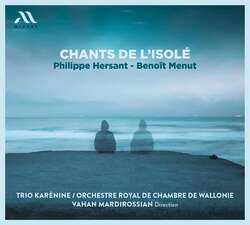Diese Produktion nimmt mit und ist definitiv nicht zur Erheiterung des Gemütes gedacht. Die dunklen Seiten des Menschen stehen in den vier Werken im Vordergrund und spiegeln unmissverständlich den Titel der CD: Chants de l’Isolé – Gesang des Abgeschiedenen nach einem Werk von Georg Trakl.
Titelgebend ist Philippe Hersants Chant de l’Isolé, eine ebenso ergreifende wie nachdenkliche Komposition. Mit viel Feingefühl und Sensibilität begleiten uns das Trio Karénine und das Orchestre royal de chambre de Wallonie durch dieses Klagelied. In keinem Moment geht die innere Spannung verloren, dieses Gefühl von Schicksalsschlägen und bösen Vorahnungen, das mit zarten Glockenschlägen am Schluss das Unausweichliche ankündigt. Der Klang bleibt immer leicht mysteriös, zum Teil mystisch ist allerdings etwas trocken, wie überhaupt in der gesamten Aufnahme.
Sehr intim, ausdrucksstark – gelegentlich in bedrohlicher Atmosphäre – erleben wir Benoît Menuts zweites Klaviertrio, Allées sombres. Nur selten lässt sich das Trio Karénine zu großen Gefühlsausbrüchen verleiten, was der Komposition unnötig Energie und Ausstrahlung geraubt hätte.
Mit einer achtsätzigen Fantaisie würdigt Philippe Hersant das Wirken des Schweizer Mäzens Paul Sacher und untermauert dieses Vorhaben mit Zitaten von Beethoven, Mahler und Shostakovich. Die Stärke der Musik und auch der Interpretation liegt allerdings woanders: in der verinnerlichten Stimmung, der wiederholten Kantabilität der Vortrages sowie der bedrückenden Ausstrahlung, die von den acht relativ kurzen Sätzen ausgeht.
Zum Abschluss des Programms gibt es dann noch eine quasi maritime Meditation: Depuis le Rivage von Benoît Menut. Auch hier spürt man Abschied, unruhige Stille. Eine insgesamt lyrisch-expressive Produktion, in der man das Engagement der Musiker, ihre Empathie für die Werke in jeder Phrase nachvollziehen kann.
This production takes with it and is definitely not intended for the exhilaration of the mind. The dark sides of man are in the foreground in the four works and unmistakably reflect the title of the CD: Chants de l’Isolé – Gesang des Abgeschiedenen after a work by Georg Trakl.
The title is Philippe Hersant’s Chant de l’Isolé, a composition that is as moving as it is thoughtful. With great subtlety and sensitivity, the Trio Karénine and the Orchestre royal de chambre de Wallonie accompany us through this lament. At no moment is the inner tension lost, this feeling of blows of fate and evil forebodings, which announces the inevitable with delicate chimes at the end. The sound always remains slightly mysterious, partly mystical is, however, somewhat dry, as in general in the entire recording.
We experience Benoît Menut’s second piano trio, Allées sombres, very intimate, expressive – occasionally in a threatening atmosphere. Only rarely does the Trio Karénine allow itself to be tempted into great outbursts of emotion, which would have unnecessarily robbed the composition of energy and charisma.
With an eight-movement Fantaisie, Philippe Hersant pays tribute to the work of the Swiss patron Paul Sacher and underpins this undertaking with quotations from Beethoven, Mahler and Shostakovich. The strength of the music and also of the interpretation, however, lies elsewhere: in the interiorized mood, the repeated cantabile nature of the performance, and the oppressive aura emanating from the eight relatively short movements.
The program concludes with a quasi-maritime meditation: Depuis le Rivage by Benoît Menut. Here, too, one senses farewell, restless silence. An altogether lyrical-expressive production, in which one can understand the musicians’ commitment, their empathy for the works in every phrase.





















